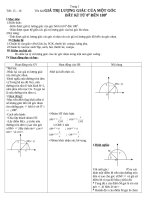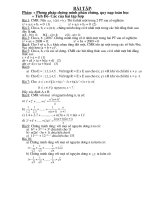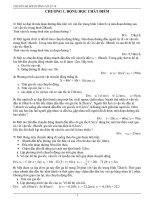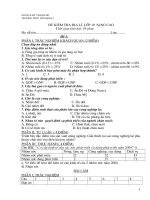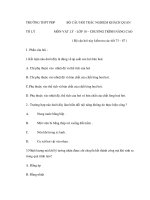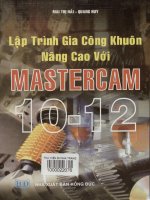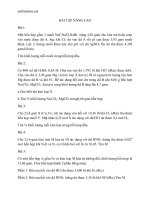Nâng cao DDDH buổi 10
Bạn đang xem bản rút gọn của tài liệu. Xem và tải ngay bản đầy đủ của tài liệu tại đây (325.87 KB, 4 trang )
PRO 3M/3MPLUS – ƠN LUYỆN TỒN DIỆN CHO KÌ THI TỐT NGHIỆP THPT QUỐC GIA
Biên soạn: Cô Vũ Thị Mai Phương – Ngoaingu24h.vn
TÀI LIỆU ĐI KÈM LIVESTREAM
LUYỆN ĐỌC ĐIỀN - ĐỌC HIỂU NÂNG CAO ( BUỔI 21)
Theo dõi LIVESTREAM ĐỘC QUYỀN của cô vào lúc
20h30 ngày 3/3/2021 duy nhất trên khóa học PRO 3MPLUS
Cơ Vũ Thị Mai Phương
ai
:T
ge
Pa
Trích đề thi thử định kì tháng 2 năm 2021 _Cơ Vũ Mai Phương
Read the following passage and mark the letter A, B, C, or D on your answer sheet to choose the word
or phrase that best fits each of the numbered blanks from 26 to 30.
SOMETHING DIFFERENT
Looking for an unforgettable way to celebrate that special occasion? Well, the range of options open to
today’s youngster – or even “oldster” for that matter, is a far cry from traditional party or restaurant visit.
No longer is it considered (26) ________ to invite your friends round, buy some food and get a barker to
produce a cake. Now, today’s birthday boy or girl is looking for something out of the ordinary, ranging
from the outrageously expensive to the downright dangerous. Anything goes, as long as it is unusual and
impressive.
Top of this year’s popular (27) _______ are as follows: taking some friends rally driving, helicopter
lessons, plane trip and parachuting and hot air ballooning. Then, there is (28) _______ group bungee
jumping or taking your buddies on a stomach-churning, white water rafting ride down rapids.
The desire for adventurous celebration is not restricted to the young. I recently met an octogenarian (29)
________ celebrated reaching the milestone of eighty by having a flying lesson.
Undoubtedly, the more traditional forms of celebration do continue to satisfy the less extravagant or less
adventurous among us. However, with my own half century looming on the horizon I would not say no
to a weekend in Paris and a meal at the Eiffel Tower. I can (30) ______ dream. Perhaps I’m eighty I’ll be
able to afford it.
(Adapted from Upstream Advanced by Virginia Evans and Lynda Edwards)
Question 26. A. old-fashioned
B. cutting-edge
C. sufficient
D. conventional
Question 27. A. experiments
B. extravagances
C. exposures
D. expenses
Question 28. A. ever
B. always
C. more
D. instead
Question 29. A. who
B. whom
C. she
D. whose
Question 30. A. however
B. but
C. moreover
D. anyway
eu
Li
K
a
ho
ay
H
oc
H
n
ie
M
im
iK
Ph
an
V
Read the following passage and mark the letter A, B, C, or D on your answer sheet to indicate the
correct answer to each of the questions from 31 to 35
Many city-dwellers around the world face a dilemma: despite living a relatively short distance from
local shops and services, a wide dual-carriageway has to be negotiated in order to get there. Whilst this
poses few problems for the vast majority of people, there are those who can only make it as far as halfway
with each push of the pedestrian crossing button. Running out of milk has significant consequences.
In the Dutch city of Tilburg, ten people have been taking part in a trial of Crosswalk, a smartphone app
that gives pedestrians with limited mobility extra crossing time. This ground-breaking experiment enables
participants to cross the road in one go, without needing to dodge cars. A sensor in the traffic lights is
constantly on the lookout for anyone with Crosswalk on their phone. It scans both sides of the road and
adjusts the crossing time automatically, once a pedestrian carrying the app has been detected. Each user
KHÓA HỌC PRO3M/PRO3MPLUS – CHINH PHỤC ĐIỂM 9+ MÔN TIẾNG ANH CÙNG CÔ VŨ MAI PHƯƠNG
PRO 3M/3MPLUS – ƠN LUYỆN TỒN DIỆN CHO KÌ THI TỐT NGHIỆP THPT QUỐC GIA
Biên soạn: Cô Vũ Thị Mai Phương – Ngoaingu24h.vn
ai
:T
ge
Pa
triggers a specific time which is pre-installed onto their phone and varies according to their level of
mobility. In this way, delays to traffic are also minimised. The app works in combination with GPS and
the software that operates the traffic lights, thus getting around the need to install further devices to control
the system.
The pilot project is part of a 25-year plan to make Tilburg’s road network more pedestrian and cyclefriendly. Another system under development there senses when bikes are approaching a junction and
changes the lights sooner than it otherwise would, thereby giving cyclists priority over motorists. A logical
extension of this technology could trigger lights to green to let ambulance or fire crews pass through.
Smart traffic lights can also have environmental benefits, for example, by giving lorries a clear run through
urban areas and reducing the frequency with which they have to stop and start, they thereby reduce
emissions, noise pollution and damage to road surfaces. All of this seems a far cry from the majority of
urban centres.
(Adapted from Exam Booster Advanced by Carole Allsop, Mark Little and Anne Robinson)
Question 31. Which would be the best title for the passage?
A. Traffic lights in big cities
B. The danger of crosswalk
C. A pedestrian and cycle-friendly road
D. Reclaiming our city streets
Question 32. The word “it” in paragraph 2 refers to _______
A. phone
B. sensor
C. light
D. pedestrian
Question 33. In the second paragraph, we learn that Crosswalk _________
A. detects the presence of vehicles
B. can be programmed by its users
C. has been relatively easy to set up
D. is being trialled on one major road
Question 34. The word “dodge” in paragraph 2 mostly means _________
A. catch
B. push
C. avoid
D. hit
Question 35. Which of the following is true, according to the passage?
A. Only a few people in big cities live near shops and services
B. The app “Crosswalk” helps pedestrians to cross the road without stopping
C. Smart light systems are being developed in Europe that gives priority to motorists.
D. Smart traffic lights cannot help to reduce gas emissions in metropolises
eu
Li
K
a
ho
ay
H
oc
H
n
ie
M
im
iK
Ph
an
V
Read the following passage and mark the letter A, B, C, or D on your answer sheet to indicate the
correct answer to each of the questions from 36 to 42
Did you notice an outbreak of joviality and generosity last week? People beaming at you as they let
you go ahead in the bus queue, grinning as they shared your morning traffic jam, smirking through the
quarterly budget planning meeting?
No? The organisers of National Smile Week will be down in the mouth. All their efforts to perk us
up for at least seven days have run, then, into the sand of our collective scepticism. Four out of ten of us
think life has become worse in the past five years. Two million of us are on antidepressants; only a
minority of us think 'people can be trusted most of the time’. Mix in some road/air/office/phone rage, a
rise in reported incivility and a good dose of political apathy and the misery malaise looks even starker.
We’re a wretched lot.
KHÓA HỌC PRO3M/PRO3MPLUS – CHINH PHỤC ĐIỂM 9+ MÔN TIẾNG ANH CÙNG CÔ VŨ MAI PHƯƠNG
PRO 3M/3MPLUS – ƠN LUYỆN TỒN DIỆN CHO KÌ THI TỐT NGHIỆP THPT QUỐC GIA
Biên soạn: Cô Vũ Thị Mai Phương – Ngoaingu24h.vn
ai
:T
ge
Pa
Money doesn't make most of us happy any more. Poor people, understandably, see their life satisfaction
rise with income but for most of the population in a country as affluent as ours, any jump-start to wellbeing
from a pay rise quickly wears off.
But what about health? Surely the virtual elimination in our society of most fatal diseases, rising lifeexpectancy and falling mortality should be cheering us up? Not a bit of it. All that happens is that our
expectations rise just as or even more quickly. Objectively, our health is better on almost every count, but
this doesn't translate into people feeling any healthier. We are more aware of their health, so we get more
anxious about it. Medicine has become a victim of its own success: having massively reduced the chances
of death in childbirth, for example, people are now shocked if a life is lost - and reach for a lawyer. Death
was unavoidable - now it is unacceptable.
Like the answer to many great problems, the answer to the question of happiness may be more prosaic:
once countries and households are free of material need, the biggest contributor to life satisfaction seems
to be a healthy set of personal relationships. The relative happiness of late teenagers and those passing
middle age may relate to their spending more time on friendships. The thirtysomethings, fighting on the
two fronts of work and children, are the most dejected. Those between full-time education and retirement
may be spending more time on the activities they think will make them happy - earning and spending than on those that actually will: spending time with friends and family.
This friend-shaped gap explains the American paradox - why the residents of the richest nation in the
world are so glum - according to Professor Robert E. Lane at Yale University. 'There is a kind of famine
of warm interpersonal relations, of easy-to-reach neighbours, of encircling, inclusive memberships, and
of solid family life,' he says.
The secret of happiness? Not money. So, leave the lawn, forget your investments and call in sick
tomorrow. Do yourself a favour. Phone a friend.
(Adapted from Upstream Advanced by Virginia Evans and Lynda Edwards)
eu
Li
K
a
ho
H
oc
H
ay
Question 36. Which best serves as the title for the passage?
A. Why do we feel so bad?
B. Happiness: A valueless thing in modern society
C. A materialistic society dominated by happiness
D. Finding real happiness: A storm in a teacup
Question 37. The phrase “down in the mouth” in paragraph 2 mostly means _________
A. realistic
B. intrigued
C. unhappy
D. ungrateful
Question 38. According to paragraph 2, people are _________
A. unwilling to spend more money
B. getting less polite
C. arguing more about politics
D. working longer hours
Question 39. The word “prosaic” in paragraph 5 is closest in meaning to ________
A. interesting
B. ordinary
C. negative
D. glamorous
Question 40. The word “it” in paragraph 4 refers to ________
A. medicine
B. victim
C. health
D. death
Question 41. Which of the following is NOT true, according to the passage?
A. National Smile Week was largely unsuccessful
B. An increase in earnings fail to make most people happier because they don’t have financial problems
C. On average, people in their early thirties face more problems
D. Improvements in health care alleviated some health problems
n
ie
M
im
iK
Ph
an
V
KHÓA HỌC PRO3M/PRO3MPLUS – CHINH PHỤC ĐIỂM 9+ MÔN TIẾNG ANH CÙNG CÔ VŨ MAI PHƯƠNG
PRO 3M/3MPLUS – ƠN LUYỆN TỒN DIỆN CHO KÌ THI TỐT NGHIỆP THPT QUỐC GIA
Biên soạn: Cô Vũ Thị Mai Phương – Ngoaingu24h.vn
Question 42. Which of the following can be inferred from the passage?
A. Any attempts to make us happy have been overpowered by a general feeling of doubt in society
B. People aged between 30 and 39 are better-educated
C. The public embraced advances in health care system at last
D. The underprivileged are always content with their life even when their incomes are unstable
ai
:T
ge
Pa
eu
Li
K
a
ho
ay
H
oc
H
n
ie
M
im
iK
Ph
an
V
KHÓA HỌC PRO3M/PRO3MPLUS – CHINH PHỤC ĐIỂM 9+ MÔN TIẾNG ANH CÙNG CÔ VŨ MAI PHƯƠNG
